ETTA JAMES / “Purple Rain”
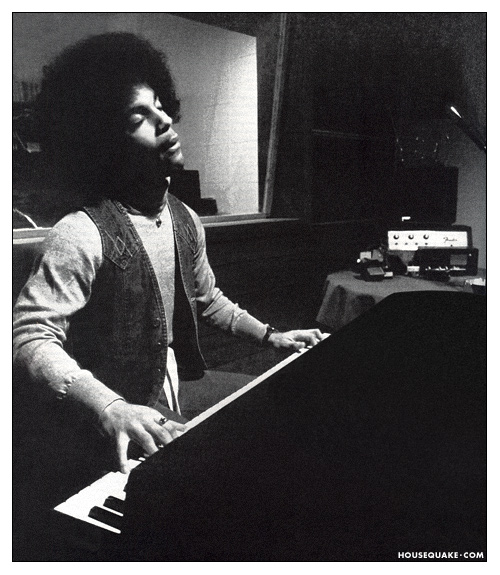 Last week, C. Liegh McInnis made an interesting observation re: Prince competing with Stevie Wonder’s Songs In The Key Of Life. All of his accomplishments notwithstanding, Prince’s body of work is not as influential as Stevie Wonder. Artists have done whole albums of Stevie Wonder covers. The truth is Stevie is in a category unto himself. In the last thirty years, no one else comes close as a composer of popular music. Indeed, even within other genres of music, such as jazz and gospel, no artist has been as influential a composer within their genre as Stevie has been within popular music as a whole. Certainly there have been dominant voices, such as reggae artist Bob Marley whose influence is worldwide. Bob is the closest to Stevie in terms of major influence, however, Stevie has a significantly larger number of songs that are covered than does Bob Marley. I think C. Liegh set an impossibly high standard by comparing Prince as a composer to Stevie Wonder.
Last week, C. Liegh McInnis made an interesting observation re: Prince competing with Stevie Wonder’s Songs In The Key Of Life. All of his accomplishments notwithstanding, Prince’s body of work is not as influential as Stevie Wonder. Artists have done whole albums of Stevie Wonder covers. The truth is Stevie is in a category unto himself. In the last thirty years, no one else comes close as a composer of popular music. Indeed, even within other genres of music, such as jazz and gospel, no artist has been as influential a composer within their genre as Stevie has been within popular music as a whole. Certainly there have been dominant voices, such as reggae artist Bob Marley whose influence is worldwide. Bob is the closest to Stevie in terms of major influence, however, Stevie has a significantly larger number of songs that are covered than does Bob Marley. I think C. Liegh set an impossibly high standard by comparing Prince as a composer to Stevie Wonder.
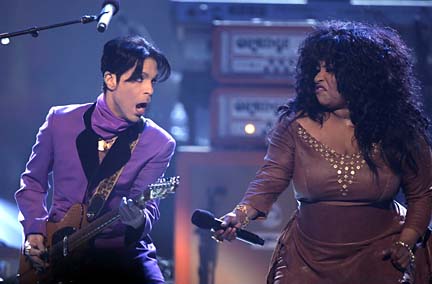 On the other hand, there have been a handful of very, very interesting Prince covers. The most well known is probably Chaka Khan’s “I Feel For You,” which, ironically uses a Stevie Wonder sample to enhance the overall impact of the interpretation. This version is not a stretch for Chaka considering that she always did incorporate rock into her style.
On the other hand, there have been a handful of very, very interesting Prince covers. The most well known is probably Chaka Khan’s “I Feel For You,” which, ironically uses a Stevie Wonder sample to enhance the overall impact of the interpretation. This version is not a stretch for Chaka considering that she always did incorporate rock into her style.
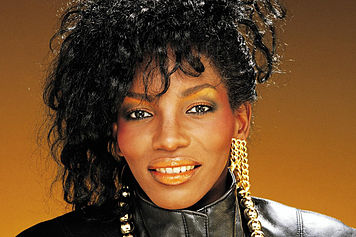 Stephanie Mills, on the other hand, transforms Prince’s ballad, "How Come You Don't Call Me Anymore?," which he did solo, playing the piano, into a gospel-influenced R&B shout-fest of insistent inquiry. Back in the day when Stephanie released her version, it was considered definitive, so much so that in later years, Stephanie’s interpretation seems to have influenced how Prince performed the song. Listen to Prince’s live version from a Portland concert. Sounds to me like Prince is trying to outdo Stephanie Mills in the screaming and hollering department.
Stephanie Mills, on the other hand, transforms Prince’s ballad, "How Come You Don't Call Me Anymore?," which he did solo, playing the piano, into a gospel-influenced R&B shout-fest of insistent inquiry. Back in the day when Stephanie released her version, it was considered definitive, so much so that in later years, Stephanie’s interpretation seems to have influenced how Prince performed the song. Listen to Prince’s live version from a Portland concert. Sounds to me like Prince is trying to outdo Stephanie Mills in the screaming and hollering department.
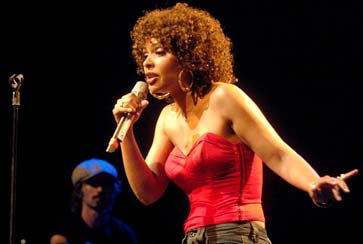 Afro-German Joy Denalane leans into "Sign O' The Times" and delivers an absolutely beautiful interpretation. Last year BoL featured a different version by Joy of this same song. This version is from her Mamani Live release. Although it eloquently speaks for itself, I am really impressed that a non-English speaker is able to deliver so convincing a reading of this signature Prince song.
Afro-German Joy Denalane leans into "Sign O' The Times" and delivers an absolutely beautiful interpretation. Last year BoL featured a different version by Joy of this same song. This version is from her Mamani Live release. Although it eloquently speaks for itself, I am really impressed that a non-English speaker is able to deliver so convincing a reading of this signature Prince song.
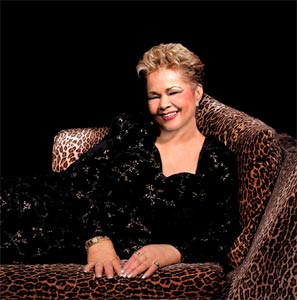 Etta James’ “Purple Rain” (from her new album, All The Way) is truly Etta James doing her wounded woman number. Given her pedigree in raunchy R&B, what is remarkable about Etta is her restraint which paradoxically intensifies the emotional impact. Etta is especially able as a story-teller. She weaves the lyrics into an hypnotic plea. At the end of the song, instead of hollering, she moans and we feel her pain that much deeper.
Etta James’ “Purple Rain” (from her new album, All The Way) is truly Etta James doing her wounded woman number. Given her pedigree in raunchy R&B, what is remarkable about Etta is her restraint which paradoxically intensifies the emotional impact. Etta is especially able as a story-teller. She weaves the lyrics into an hypnotic plea. At the end of the song, instead of hollering, she moans and we feel her pain that much deeper.
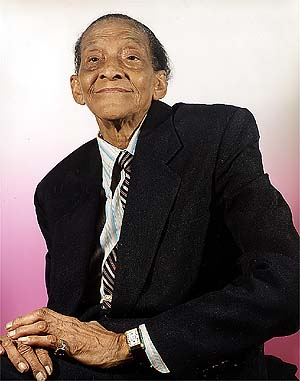 Finally, we close with a completely left field interpretation of “Nothing Compares 2 U.” Little Jimmy Scott is not only a unique stylish as a singer, his personal life is full of anguish, disappointment, and commercial abuse on top of suffering from a rare childhood disease which completely arrested his growth pre-puberty. Not only is his natural singing voice high-pitched, his emotional inclination is toward oft-kilter phrasing, he favors ultra-slow tempos, and luxuriates in verbal interpretations that highlight the nuances and ambiguities of the lyrics he chooses to sing. Some find him off-putting and difficult to listen to, others are entranced; everyone is strongly affected by this one-of-a-kind vocalist.
—Kalamu ya Salaam
Prince’s Covers Cover a Spectrum
Sometimes covers tell you something about the artist doing the remake, and sometimes covers tell you about the original artist. In Prince’s case, the names of people who have covered his songs are a who’s who of music hall of fame. Just look at the list: Stephanie Mills, Joe Cocker, Billy Cobham, Herbie Hancock, Ice T, Chaka Khan, Cyndi Lauper, D’Angelo, TLC, Ginuwine, Tina Turner, Etta James, and Quindon Tarver. This list speaks to Prince’s diversity as an artist. The running theme in all of these covers is that all but three of the artists choose to strip the song to its bare essence in order to articulate the genre/spirit of the song.
Etta James’ “Purple Rain” is striped naked of the keyboard parts to reveal a bluesy twang. Stephanie Mills takes “How Come You Don’t Call Me,” which is just Prince and a piano, and by filling the spaces with her full vocals shows us that Prince spent a lot of in the church. Buddy Miles takes “Baby I’m a Star,” a song which most covers turn into a god-awful show tune, strips the keyboards, turns up and runs the bass, making it a soul tune with Memphis grit. Billy Cobham and Herbie Hancock show why Miles Davis was so tight with Prince in the last years of his life. Cobham’s version of “Sign ‘O’ the Times” and Hancock’s “Thieves in the Temple” show that Prince’s work in jazz will be more in spirit than in actual arrangement of notes. Both covers remove the polish of pop to reveal compositions that are designed with enough space to be reworked in countless directions.
Of course there are some duds. Ice T almost castrates “Head” because his goal was to see if he could be more shocking, putting the emphasis on how many curse words and misogyny he could get into the lyrics. Yet, most show us the rainbow of Prince, such as Joe Cocker’s version of “Five Women,” which provides some blue-eyed beer and cigarette soul and Scott Holt’s version of “Five Women,” which takes Prince to Nashville and makes a country/rock songwriter of him. Chaka Khan’s “I Feel for You” is, of course, brilliant, aided by a sample of Stevie Wonder’s harmonica and Melle Mel’s intro. And on a very personal note, one of my favorite remakes is by then ten year old Quindon Tarver backed by a boy’s choir as he weaves through “When Doves Cry” from Romeo and Juliet. The arrangement of this song breathes additional life into it as they were able to keep the gut-wrenching haunting quality of the song while they added strings, a choir, and a more syncopated drum beat. But the glue to all of that is Tarver’s vocal gymnastics. It’s not his octave range that is so impressive as it is his emotional range. His school boy tenor and angelic falsetto quilts a fabric that cloaks the listener in the heartbreak of humans treating other humans inhumanely. He truly sounds like doves crying.
From James to Tarver, Prince’s honesty and creativity make his songs a staple on the set lists of bar bands everywhere. His desire not to be pigeonholed by somebody else’s notion of what a black artist should be continues to punch the world in the gut with great songs that hit their mark with so many of us.
—C. Liegh McInnis
Without Prince...
As a major, major fan of both Stevie Wonder and Prince, I think the Stevie Wonder comparison is very accurate. There's two reasons Kalamu can't see it. First, he just ain't feeling Prince, period, so any praise aimed Prince's way is going to seem inaccurate to him. More to the point, I don't think Kalamu is familiar with the breadth of Prince's music. From 1980 through 1987, Prince dropped a series of classic albums (seven in all), each one powerful enough to create its own new musical reality. Believe me, it wasn't just me and C. Leigh, all of those future R&B-ers of today were all ears too. The truth is, Prince and his Minneapolis Sound is the defining influence of black popular music (and a lot of white popular music too) for the entire decade of the Eighties as well as most of the Nineties. (For the sake of this argument, I'm leaving hip-hop out of the discussion. That's a whole 'nother story.) Without Prince, there's no D'Angelo, no Macy Gray, no Tony Toni Tone or Raphael Saadiq, no Jimmy Jam & Terry Lewis, no Lenny Kravitz, no TLC, no Erykah Badu and on and on. (No pun intended.)
As for the covers, I have to admit that I'm not a big fan of Prince covers. Like, say, James Brown, Prince is such an original that other artists always seem to fall flat when attempting to sing his music. That said, Stephanie Mills did an awesome job with "How Come U Don't Call Me Anymore." Back in the day, that (the remake) was a classic slow jam. But Baba, you're wrong about Prince trying to copy Stephanie Mills' version. Maybe you're not familiar with the original, but it's actually Stephanie Mills who is copying Prince's phrasing down to the ad libs. (I don't mean the live version that's posted here. I'm talking about the original b-side.) And that scream Prince throws in is him just having fun by doing the exact scream he did at the end of "Darling Nikki" (from Purple Rain). It was like a little wink to the hardcore fans in the audience, like, "Remember this?" It doesn't have anything to do with Stephanie Mills; he's just clowning around—frankly, he sounds bored. I've seen Prince live several times and he's always more interested in his new material than his old hits. (Although at Essence, he did revive his own interest in his old material by rearranging a lot of the songs.)
You're right about the Jimmy Scott—it is interesting. I can't say I really like it, but it is out there a minute. The Chaka Khan is a well known hit, of course. I never was crazy about either it or the Prince original—they're both way too "pop-ish" for me. I like the Etta James. The acoustic guitar is nice. Of course, we left out the best Prince cover of all—Sinead O'Connor's version of "Nothing Compares 2 U." The irony there being that it technically wasn't a Prince song in the first place. It was an album track for a Prince side project named The Family that Prince cooked up for his then-girlfriend (I think) Susannah Melvoin. But Sinead freaked it for sure. And as for Joy, she's the shit. I think we agreed on that already.
Finally, we close with a completely left field interpretation of “Nothing Compares 2 U.” Little Jimmy Scott is not only a unique stylish as a singer, his personal life is full of anguish, disappointment, and commercial abuse on top of suffering from a rare childhood disease which completely arrested his growth pre-puberty. Not only is his natural singing voice high-pitched, his emotional inclination is toward oft-kilter phrasing, he favors ultra-slow tempos, and luxuriates in verbal interpretations that highlight the nuances and ambiguities of the lyrics he chooses to sing. Some find him off-putting and difficult to listen to, others are entranced; everyone is strongly affected by this one-of-a-kind vocalist.
—Kalamu ya Salaam
Prince’s Covers Cover a Spectrum
Sometimes covers tell you something about the artist doing the remake, and sometimes covers tell you about the original artist. In Prince’s case, the names of people who have covered his songs are a who’s who of music hall of fame. Just look at the list: Stephanie Mills, Joe Cocker, Billy Cobham, Herbie Hancock, Ice T, Chaka Khan, Cyndi Lauper, D’Angelo, TLC, Ginuwine, Tina Turner, Etta James, and Quindon Tarver. This list speaks to Prince’s diversity as an artist. The running theme in all of these covers is that all but three of the artists choose to strip the song to its bare essence in order to articulate the genre/spirit of the song.
Etta James’ “Purple Rain” is striped naked of the keyboard parts to reveal a bluesy twang. Stephanie Mills takes “How Come You Don’t Call Me,” which is just Prince and a piano, and by filling the spaces with her full vocals shows us that Prince spent a lot of in the church. Buddy Miles takes “Baby I’m a Star,” a song which most covers turn into a god-awful show tune, strips the keyboards, turns up and runs the bass, making it a soul tune with Memphis grit. Billy Cobham and Herbie Hancock show why Miles Davis was so tight with Prince in the last years of his life. Cobham’s version of “Sign ‘O’ the Times” and Hancock’s “Thieves in the Temple” show that Prince’s work in jazz will be more in spirit than in actual arrangement of notes. Both covers remove the polish of pop to reveal compositions that are designed with enough space to be reworked in countless directions.
Of course there are some duds. Ice T almost castrates “Head” because his goal was to see if he could be more shocking, putting the emphasis on how many curse words and misogyny he could get into the lyrics. Yet, most show us the rainbow of Prince, such as Joe Cocker’s version of “Five Women,” which provides some blue-eyed beer and cigarette soul and Scott Holt’s version of “Five Women,” which takes Prince to Nashville and makes a country/rock songwriter of him. Chaka Khan’s “I Feel for You” is, of course, brilliant, aided by a sample of Stevie Wonder’s harmonica and Melle Mel’s intro. And on a very personal note, one of my favorite remakes is by then ten year old Quindon Tarver backed by a boy’s choir as he weaves through “When Doves Cry” from Romeo and Juliet. The arrangement of this song breathes additional life into it as they were able to keep the gut-wrenching haunting quality of the song while they added strings, a choir, and a more syncopated drum beat. But the glue to all of that is Tarver’s vocal gymnastics. It’s not his octave range that is so impressive as it is his emotional range. His school boy tenor and angelic falsetto quilts a fabric that cloaks the listener in the heartbreak of humans treating other humans inhumanely. He truly sounds like doves crying.
From James to Tarver, Prince’s honesty and creativity make his songs a staple on the set lists of bar bands everywhere. His desire not to be pigeonholed by somebody else’s notion of what a black artist should be continues to punch the world in the gut with great songs that hit their mark with so many of us.
—C. Liegh McInnis
Without Prince...
As a major, major fan of both Stevie Wonder and Prince, I think the Stevie Wonder comparison is very accurate. There's two reasons Kalamu can't see it. First, he just ain't feeling Prince, period, so any praise aimed Prince's way is going to seem inaccurate to him. More to the point, I don't think Kalamu is familiar with the breadth of Prince's music. From 1980 through 1987, Prince dropped a series of classic albums (seven in all), each one powerful enough to create its own new musical reality. Believe me, it wasn't just me and C. Leigh, all of those future R&B-ers of today were all ears too. The truth is, Prince and his Minneapolis Sound is the defining influence of black popular music (and a lot of white popular music too) for the entire decade of the Eighties as well as most of the Nineties. (For the sake of this argument, I'm leaving hip-hop out of the discussion. That's a whole 'nother story.) Without Prince, there's no D'Angelo, no Macy Gray, no Tony Toni Tone or Raphael Saadiq, no Jimmy Jam & Terry Lewis, no Lenny Kravitz, no TLC, no Erykah Badu and on and on. (No pun intended.)
As for the covers, I have to admit that I'm not a big fan of Prince covers. Like, say, James Brown, Prince is such an original that other artists always seem to fall flat when attempting to sing his music. That said, Stephanie Mills did an awesome job with "How Come U Don't Call Me Anymore." Back in the day, that (the remake) was a classic slow jam. But Baba, you're wrong about Prince trying to copy Stephanie Mills' version. Maybe you're not familiar with the original, but it's actually Stephanie Mills who is copying Prince's phrasing down to the ad libs. (I don't mean the live version that's posted here. I'm talking about the original b-side.) And that scream Prince throws in is him just having fun by doing the exact scream he did at the end of "Darling Nikki" (from Purple Rain). It was like a little wink to the hardcore fans in the audience, like, "Remember this?" It doesn't have anything to do with Stephanie Mills; he's just clowning around—frankly, he sounds bored. I've seen Prince live several times and he's always more interested in his new material than his old hits. (Although at Essence, he did revive his own interest in his old material by rearranging a lot of the songs.)
You're right about the Jimmy Scott—it is interesting. I can't say I really like it, but it is out there a minute. The Chaka Khan is a well known hit, of course. I never was crazy about either it or the Prince original—they're both way too "pop-ish" for me. I like the Etta James. The acoustic guitar is nice. Of course, we left out the best Prince cover of all—Sinead O'Connor's version of "Nothing Compares 2 U." The irony there being that it technically wasn't a Prince song in the first place. It was an album track for a Prince side project named The Family that Prince cooked up for his then-girlfriend (I think) Susannah Melvoin. But Sinead freaked it for sure. And as for Joy, she's the shit. I think we agreed on that already.  —Mtume ya Salaam
maybe we're both right to wonder
By which I mean, I understand and agree with you that Prince has been a major influence in the popular music world. I think you hit it right when you said "Prince is such an original that other artists always seem to fall flat when attempting to sing his music." And that is my point of comparison with Stevie as composer, bunches of people have made beautiful versions of Stevie's music even though he too is an original. Perhaps, as I hinted somewhere in one of these write-ups, Prince is grand theatre as much as he is a composer of music, indeed, I should say "more" than he is a composer of music. Stevie was never grand theatre as a performer, he always was about the music. So, yes, Mtume, I agree with you in giving big ups to Prince as a major mover of the eighties into the nineties. And I stand by what I said in terms of people covering his music, Prince is no where close to Stevie in that regard.
Thanks for correcting me on the Prince/Stephanie Mills influence.
Lastly, I added that Sinead version to the jukebox. It's cool but Jimmy Scott still has my ear on that one.
—Kalamu ya Salaam
—Mtume ya Salaam
maybe we're both right to wonder
By which I mean, I understand and agree with you that Prince has been a major influence in the popular music world. I think you hit it right when you said "Prince is such an original that other artists always seem to fall flat when attempting to sing his music." And that is my point of comparison with Stevie as composer, bunches of people have made beautiful versions of Stevie's music even though he too is an original. Perhaps, as I hinted somewhere in one of these write-ups, Prince is grand theatre as much as he is a composer of music, indeed, I should say "more" than he is a composer of music. Stevie was never grand theatre as a performer, he always was about the music. So, yes, Mtume, I agree with you in giving big ups to Prince as a major mover of the eighties into the nineties. And I stand by what I said in terms of people covering his music, Prince is no where close to Stevie in that regard.
Thanks for correcting me on the Prince/Stephanie Mills influence.
Lastly, I added that Sinead version to the jukebox. It's cool but Jimmy Scott still has my ear on that one.
—Kalamu ya Salaam
This entry was posted on Sunday, October 29th, 2006 at 1:45 am and is filed under Cover. You can follow any responses to this entry through the RSS 2.0 feed. You can leave a response, or trackback from your own site.
Leave a Reply
| top |